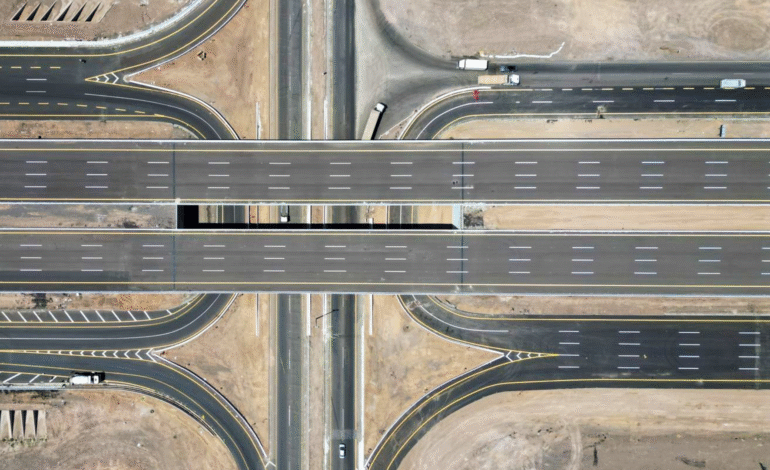Saudi Arabia Unveils Unified Road Code To Modernize National Transport Network

Saudi Arabia Officially Launches Its First Unified Road Code
Saudi Arabia’s Roads General Authority (RGA) marked a major achievement on June 19, 2025, with the launch of the Saudi Road Code. This significant announcement was made during a formal event held in Riyadh at 10:00 AM local time. The event gathered senior officials from the Ministry of Transport and Logistics Services, engineers, planners, contractors, and representatives from the private sector. The Saudi Road Code is part of the Kingdom’s broader effort to modernize its infrastructure in alignment with Vision 2030. It introduces clear, unified guidelines for classifying, designing, constructing, and managing all roads across the country, ensuring future projects meet the highest standards of quality, safety, and environmental responsibility.
Establishing National Standards For Road Development
The Saudi Road Code provides a single technical framework for categorizing and managing every type of road in the Kingdom, from major highways and urban thoroughfares to rural routes and local streets. The code eliminates the inconsistencies that previously existed due to varying regional guidelines. With this unified system, Saudi Arabia ensures that road infrastructure across the nation meets consistent benchmarks for quality, durability, and safety. This comprehensive framework enhances coordination between government agencies, contractors, and developers and aligns Saudi Arabia’s transport systems with international best practices.
Historical Context Behind Saudi Road Infrastructure
Before the introduction of the Saudi Road Code, road development across the Kingdom was shaped by regional practices that varied between provinces and municipalities. Major roads such as the Riyadh-Dammam Highway and the Mecca-Medina Road showcased the Kingdom’s engineering capabilities. However, the lack of unified standards led to disparities in quality, maintenance, and design, particularly in smaller or rural roads. Since the economic boom of the 1970s, Saudi Arabia has invested heavily in building a national transport network. The Saudi Road Code represents the culmination of years of planning to create a system that addresses these gaps and supports the nation’s future needs.
Aligning Road Development With Vision 2030 Goals
The Saudi Road Code directly supports the objectives of Vision 2030, the national strategy to diversify the economy and reduce dependence on oil. The code ensures that road infrastructure enhances connectivity between industrial zones, ports, airports, cities, and rural areas. This connectivity promotes regional development, facilitates investment, and supports sectors such as logistics, tourism, and manufacturing. The new framework will help reduce travel times, lower transportation costs, and improve residents’ access to essential services, including healthcare, education, and employment opportunities.
Enhancing Road Safety Standards Nationwide
Road safety is one of the top priorities of the Saudi Road Code. The framework specifies strict requirements for road geometry, including curvature, width, and slope, to ensure safer designs. It standardizes the use of traffic control devices such as signals, signage, and road markings to enhance driver awareness and compliance. The code includes clear specifications for lighting systems to improve visibility during night-time and adverse weather conditions. It also mandates the installation of safety barriers and crash protection systems aimed at minimizing the impact of road collisions, thereby helping to reduce accident rates across the Kingdom.
Promoting Environmental Sustainability In Road Projects
Environmental protection is a key focus of the Saudi Road Code. The framework encourages construction methods that minimize land disturbance and protect ecosystems. It includes guidelines for managing stormwater runoff to prevent erosion and maintain water quality. The code promotes the use of low-emission construction materials and technologies to reduce the carbon footprint of road projects. These measures are aligned with the Kingdom’s national sustainability goals under the Saudi Green Initiative, reflecting a commitment to responsible development that safeguards natural resources for future generations.
Streamlining Design, Approval, And Delivery Processes
The Saudi Road Code simplifies the design and approval process for road projects by offering clear technical specifications that can be applied consistently nationwide. This clarity reduces design errors, shortens project approval timelines, and enables faster completion of construction works. The code helps planners and engineers develop more accurate project budgets, allocate resources effectively, and plan for long-term maintenance. By establishing a uniform framework, the code supports the efficient use of public funds and ensures that infrastructure investments deliver maximum value to the national economy.
Economic And Social Benefits Of A Unified Road Code
The introduction of the Saudi Road Code is expected to bring widespread economic and social benefits. Enhanced road connectivity will support regional integration, making it easier for people in remote or underserved areas to access critical services and economic opportunities. Improved infrastructure will help businesses reduce logistics and transport costs, strengthen supply chains, and enhance Saudi Arabia’s competitiveness as a regional trade and logistics hub. The tourism sector will also benefit from better road access to cultural, historical, and natural sites, contributing to the Kingdom’s goal of becoming a leading global tourism destination.
Supporting Smart Cities And Future Mobility Solutions
The Saudi Road Code is designed with the future in mind, supporting the integration of smart technologies into the national transport system. Its standards are compatible with smart traffic management systems, autonomous vehicle deployment, electronic toll collection, and real-time monitoring solutions. The code ensures that the Kingdom’s road infrastructure is ready for the transition to smart cities, where technology-driven solutions will enhance urban mobility, reduce congestion, and improve the quality of life for residents.
Developing Local Expertise And Building Capacity
The successful implementation of the Saudi Road Code depends on the availability of skilled professionals who understand and can apply its standards. Beginning in July 2025, the RGA will launch training programs, certification courses, and workshops across major cities such as Riyadh, Jeddah, Dammam, and Medina. These programs will ensure that local engineers, planners, and contractors are equipped with the knowledge and skills needed to deliver infrastructure that meets the new national standards. This focus on capacity building will help develop a strong local workforce that can support the Kingdom’s long-term development goals.
Continuous Improvement Through Regular Reviews
The Saudi Road Code is designed as a living document that will evolve over time to incorporate new technologies, lessons learned from projects, and international developments. The RGA has committed to conducting a formal review of the code every two years, with the first update planned for mid-2027. This review process will ensure that the code remains responsive to emerging challenges and opportunities, such as climate change, technological innovation, and changing mobility patterns. The continuous refinement of the code will help Saudi Arabia maintain its position as a leader in regional infrastructure development.
Statements From Leaders At The Launch Event
At the conclusion of the launch event, held at 12:30 PM local time, senior government officials emphasized the importance of the Saudi Road Code in supporting national priorities. The Minister of Transport and Logistics Services highlighted that the code reflects Saudi Arabia’s determination to build safe, sustainable, and future-ready infrastructure that supports Vision 2030. The Director General of the RGA noted that the development of the code was the result of extensive research and collaboration and called on all stakeholders to work together to ensure its successful implementation. The event closed with a strong call to action for engineers, developers, and contractors to adopt the code and contribute to the Kingdom’s ambitious transformation.








2 Comments
[…] portfolios in the region, balancing between established hubs like Dubai and emerging markets in Saudi Arabia. Investors will benefit from a wider array of options in terms of property types, pricing, and […]
[…] Saudi Arabia is embarking on an ambitious journey to redefine its transport and logistics sector, aiming to position itself as a global logistics hub under the transformative framework of Vision 2030. Announced by Minister of Transport and Logistics Services Saleh Al Jasser at the Global Aviation and Maritime Transport Summit, the Kingdom’s plans include a 50% expansion of the national railway network and a goal to double passenger capacity at its airports. These initiatives, detailed by Saudi Akhbar24, are part of the National Transport and Logistics Strategy launched in 2021, a cornerstone of Vision 2030 that seeks to diversify the economy and reduce oil dependency. This article explores Saudi Arabia’s bold steps toward building a people-centric, technology-driven, and policy-focused transport ecosystem, highlighting key projects and their impact on regional and global connectivity. […]
Comments are closed.